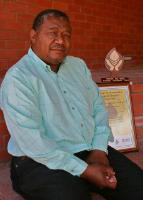
Though Velile Quza has been teaching for 17 years, his appetite for learning has never waned. Quza teaches Grade 10 - 12 English in Grahamstown’s Khutliso Daniels Secondary School, but has embarked on a part time Honours in Environmental Eduction through Rhodes University. But more important than his continued self-education, is his desire to share his new knowledge with his students. “I thought: let me make use of what I now know in this learning environment,” says Quza, explaining his reasons for starting an invasive plant species project which is getting his classes excited about environmental issues.
Quza’s enthusiasm and initiative has not gone unnoticed. He was recently honoured with an award by the Department of Environmental Affairs at the National Environmental Education Teacher’s Conference in Gauteng. “It’s something new to be able to engage the learners in discussions about the invasive alien plants,” says Quza who has taken classes on three field trips where learners identify alien plants and witness first hand, their adverse effect on the environment. The focal species are prickly pear, the guava tree and the pine tree.
“They are a very cooperative class -- most of them very bright,” says Quza, hopes to take the programme further. “There is so much that we can do as a school by sharing information with learners first,” says Quza, “and then when we want to reach out [to the community], we have to find some ways of doing it.”
This is the first year Khutliso Daniels Secondary School has participated in the Eco-School programme, an international initiative adopted by the Department of Education with the aim of integrating environmental education and sustainable living practices into school curriculum. In its first year, an Eco-School is challenged to choose a project and create three lesson plans based on one of five themes: resource use, nature and biodiversity, local and global issues, healthy living and community heritage. Each succeeding year, the school takes on new projects and themes. The idea is to combine experiential and classroom learning by building lesson plans around relevant environmental issues.
Work like this is a beacon amidst damning reports of apathetic teachers and poorly managed schools in the Eastern Cape. Quza goes on to explain how Khutliso Daniels is trying out new ways of supporting their Gr12 learners. The school has implemented a programme that allows matriculants to stay on school grounds until 6pm, giving them a neutral environment in which to study; and while here, a meal is provided for them. The learners come from poor homes -- situations that are not conducive to serious academics. The school is making every effort to counteract this reality, however. “We are working very hard to achieve good results,” says Quza, “The teachers are highly dedicated.”
